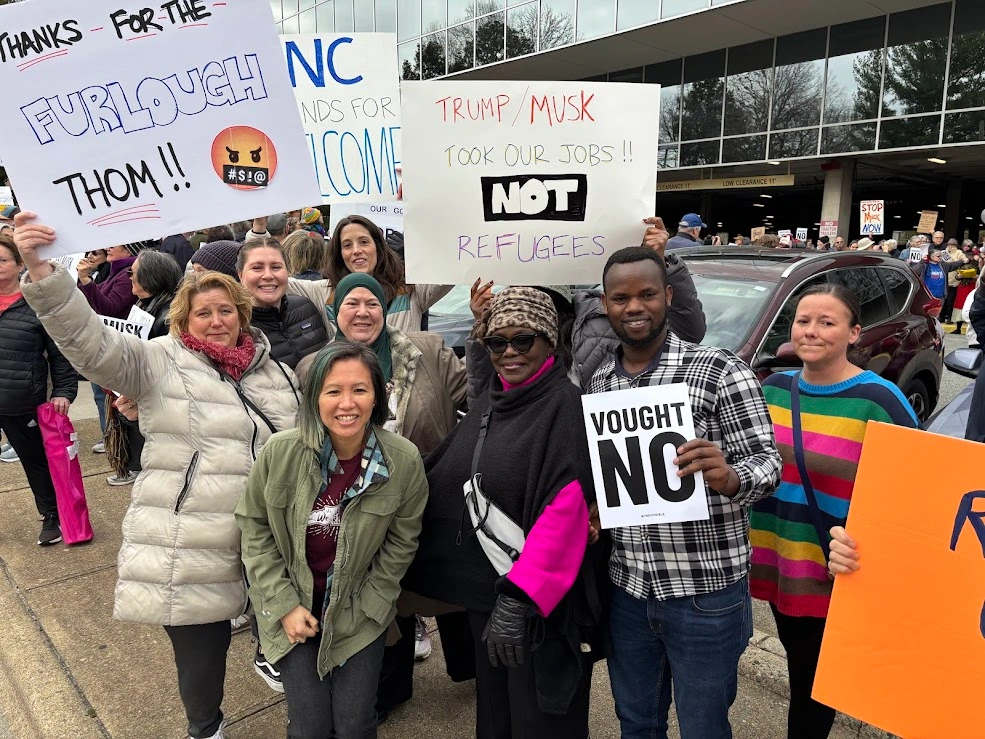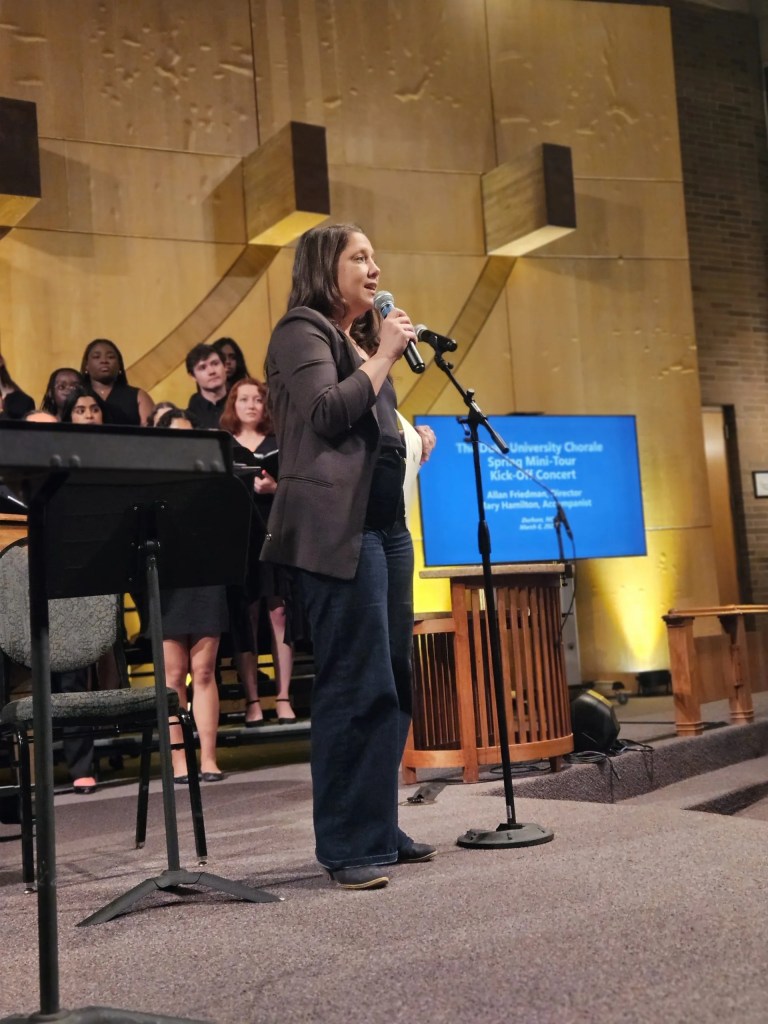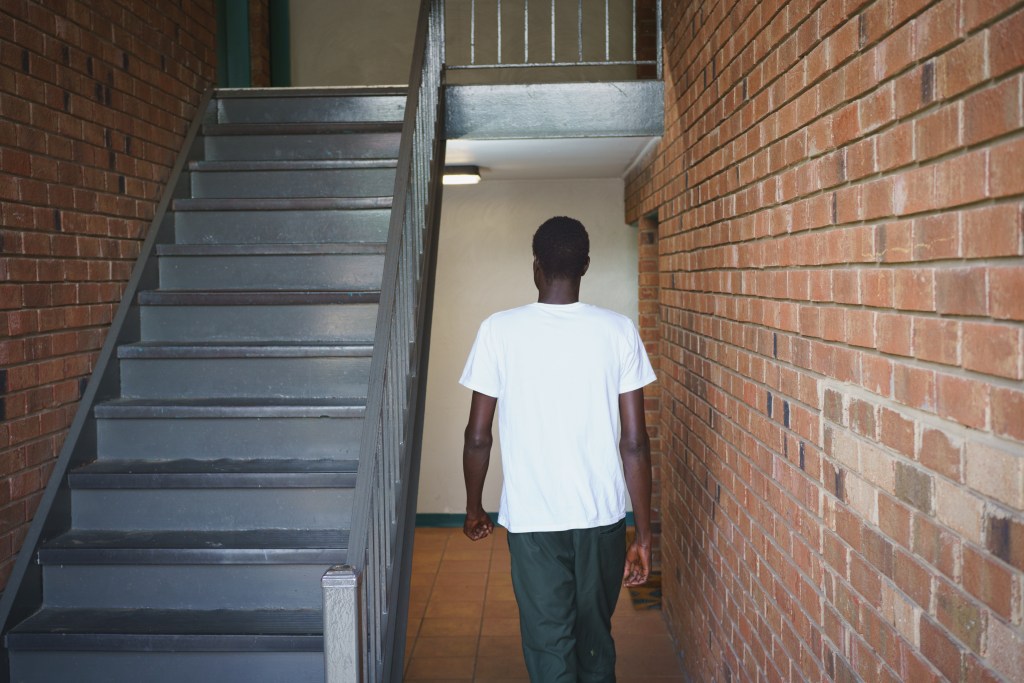This story originally published online in The Assembly.
Two days after Christmas 2024, Mangar arrived in Greensboro’s Piedmont Triad International Airport in pouring rain. With him were his pregnant wife, their six children, and four suitcases packed with the weight of 13 years in Kenya’s refugee camps.
He had never seen North Carolina. His only glimpse came from a pamphlet handed to him by the International Organization for Migration. It mentioned a museum, a coliseum, and some mountains. “This is an old city where people have lived a long time,” he remembered thinking.
Born in 1989 during Sudan’s civil war—a conflict that killed more than 2 million—Mangar is Dinka, part of a Christian minority that bore the brunt of the fighting. The Assembly is withholding his last name due to security concerns. At 14, he was placed on a Red Cross flight to Lokichokio in northwest Kenya, then to Kakuma refugee camp, and later was relocated to Dadaab, another settlement in the eastern part of the country.
He waited nearly two decades for a call from the United Nations High Commissioner for Refugees (UNHCR). It finally came when he was 36.
“I knew when a time like that would come, and I’ll just feel prepared in every situation,” he said.
While Mangar folded thick jackets for a winter he’d never known, Stephanie Chandler made calls. She works as a housing program manager at Church World Service Greensboro, helping newly arrived refugee families to find a roof to live under. She found them a three-bedroom unit tucked into a wooded part of central Greensboro, paid the deposit, and covered the first month’s rent.
She knew she was racing the clock. The country was about to install a president who had already once halted refugee resettlement—and promised to do it again.
An Impossible Task
For the staff and volunteers helping refugees rebuild their lives in the U.S., each arrival marked the end of a years-long journey through one of the world’s most intensive vetting systems.
Federal law defines a refugee as someone who cannot return home due to persecution or a well-founded fear of it, based on “race, religion, nationality, social group, or political opinion.” Unlike asylum seekers, who must already be in the U.S. or at a port of entry to request protection, refugees are vetted abroad and mostly referred by UNHCR, U.S. embassies, or non-governmental organizations. For years, the resettlement program stood on rare bipartisan ground. But as displacement surged, that consensus cracked. Unfounded fears associating refugees with terrorism and economic strain crept in.
Still, for many Americans, especially evangelical Christians, the work has always been more than politics. Resettlement is a moral calling, rooted in faith and a duty to shelter those in need.
The economic argument, too, has gained strength. From 1990 to 2022, refugees added a net positive fiscal impact of $123.8 billion. They open businesses and join the workforce, sometimes at rates higher than native-born citizens despite greater barriers.
Nearly 20,000 refugees have arrived in North Carolina over the past decade. In Durham and Greensboro, their presence is woven into streetscapes: Vietnamese sandwich shops squeeze between laundromats; trays of pistachio-studded baklava gleam behind glass; and on Sundays, gospel in Swahili, French, and English spills out of modest storefront churches.
“Even though refugee resettlement is a humanitarian program—and I wish that was enough for most people—it isn’t always enough,” said Adam Clark, director of World Relief Durham. “The positive economic impact is becoming more and more part of our talking points. Refugees are just a very small slice of the total immigrant population, but even that small group brings over $8 billion to the U.S. each year.”
Church World Service (CWS) and World Relief are two of 10 nationwide organizations that hold a federal contract to support refugees with housing, education, and workforce preparation that can span years. As a second Trump term loomed, the end of those services sounded less like a possibility and more like a countdown.
The past holds a reminder. In 2018, the Trump administration slashed the annual refugee cap to 45,000—the lowest since 1980. By May that year, 134 resettlement offices nationwide had shut down or been barred from taking new cases.
The president alone sets the refugee cap, and with it, a lifeline. All North Carolina offices run by national resettlement agencies depend on the State Department’s refugee bureau and the Department of Health and Human Services’ Office of Refugee Resettlement for roughly 80 percent of their budget. Without that money, they can’t pay staff, secure apartments, or walk families through their first weeks.

Credit: Photo courtesy of Stephanie Chandler
This year, with Trump pledging more cuts on immigration programs, including ending the CBP One app for asylum seekers and rolling back Temporary Protected Status for several nationals, including Haitians and Venezuelans, resettlement agencies rushed to act.
Between September and December 2024, caseworkers and volunteers across North Carolina scrambled to place 924 newcomers, according to the State Department’s data. They secured housing, arranged medical care, and set up job interviews, knowing that the refugee admissions again teetered on suspension in a sweeping rollback of immigration policy.
“Soon, the gates will close—at least temporarily—to refugees and others seeking safety, as they did for our ancestors,” Marian Abernathy, a leader of Durham-based Judea Reform Congregation’s refugee resettlement and immigrant justice project, warned her congregation and immigrant supporters in a newsletter in November.
On January 20, 2025, the U.S. State Department froze refugee resettlement for a 90-day review. By May, the freeze still held, except for fifty-nine white South Africans who landed in Virginia and were fast-tracked through an expedited program. Meanwhile, ten thousand refugees already cleared for arrival remained barred from entry. At a Senate Foreign Relations Committee hearing on May 21, senators pressed Secretary of State Marco Rubio on the freeze and the racial prioritization, to which Rubio responded: “The United States has the right to pick and choose who they allow in.”
The freeze didn’t just stop the flow of newcomers—it pulled the floor out from under those already here. The order halted the Reception and Placement program, a lifeline for a refugee’s first 90 days in the U.S. Chaos unfolded over February as those who arrived most recently became the most vulnerable. World Relief Triad said the freeze stripped support from 99 recent arrivals and cut off assistance to 300 others. Church World Service of Durham announced that it was furloughing two-thirds of its staff who kept new arrivals housed and fed. Lutheran Services Carolinas in Salisbury halted its aid to recent refugees. The Trump administration did not respond to a request for comment.
Falling Apart
Mangar loves the news. While in the refugee camp, he scavenged every broadcast, magazine, and website. His first week in the U.S., he watched the inauguration on every screen. He’d heard the talk on immigration. He wasn’t worried.
“My arrival in the U.S. wasn’t by chance,” he said. “It was something that was given to me in a legal way, and I came here when the government knew that I was coming.”
As his family moved into the apartment Chandler secured after three weeks in the Extended Stay hotel, Mangar’s familiar itch to check the latest updates turned sour: the resettlement office was shrinking. The caseworker for Mangar’s family is furloughed. Most questions his family had now went to the volunteers, Lorrie and Len Nyland, who drove his wife to her prenatal check at nearby Cone Health Hospital and helped open the couple’s first bank account.
On February 5, Chandler logged into the blog she’s run since 2017 and wrote, “Our refugee resettlement office of 63 staff is now down to 18.”
She was among the 45 furloughed employees at Church World Service’s Greensboro office, joining hundreds of resettlement workers who were let go in a single sweep in cities and towns across the country.
Chandler described the first three days of furlough as “traumatic, foggy, confusing, and heartbreaking.” One moment, she cried. The next time, she was furious. “This is not just a terrible way to lose a job,” she added, “it’s painful because the CWS team was the best.”
Chandler is 55 and has lived in Greensboro for more than 30 years. Resettling refugees is what she calls her dream job, though it often feels like a scramble. Families, ranging from the size of one to a dozen, sometimes arrive with just days to find housing in a city where options are slim.
“I couldn’t place them in fancy places,” Chandler said. “But they were decent and safe.”
CWS now works with eight housing providers across Greensboro, a step up from the past when refugees were often placed in blighted neighborhoods. In 2018, a fire at the Summit-Cone apartment claimed the lives of five Congolese children. A 2021 North Carolina Health News investigation revealed that such housing challenges are typical among refugee placements, with families frequently placed in substandard conditions due to agency haste and limited options.
As resettlement agencies are laying off staff, refugees began knocking on the door of the community resource center serving immigrants, such as the Center for New North Carolinians, seeking better homes. “One guy came to me,” recalled Allyson Crickenberger, program director at the center. “He’d been followed home and beaten up. Five people are still living in that apartment.” She also saw a visible uptick in the number of clients asking for help to find jobs.
Filling the Gap
One evening in March, as soft dusk settled over Durham, Abernathy stood behind a small table inside the first floor of the two-story synagogue. Beside her stood Bethany Showalter, interim director of the CWS Durham office, her expression caught between hope and apology.
In the auditorium, students from the Duke Chorale tuned their voices for a concert supporting the emergency fund to stabilize new arrivals.
Showalter, in a black blazer and a brittle smile, would soon face a crowd of retirees, many of whom had once personally sponsored refugees. Until just weeks earlier, they had all believed that new families were still on their way.

Credit: Hope Zhu for The Assembly
“Our program has been built over the years, and we’ve tried to continue to make it better, make it more holistic. Seeing it being dismantled right now is incredibly disheartening,” she told the audience, voice strained. “Being a welcoming presence, being a friend, goes a really long way. That cannot be taken away.”
She asked for any job leads for the nearly 200 refugees who arrived since October—the employment team at CWS, once eight strong, had been cut down to three. As she stepped down, Duke Chorale swelled into song: “An eye for an eye and the whole world goes blind. And how deep that darkness, and the light is nowhere to be found.”
Abernathy didn’t just sit and listen. That same afternoon, she and her team walked into the office of an aide to Sen. Thom Tillis, pressing for the resumption of refugee admission.
“I wish we were furnishing homes,” she said, “Meeting families at the airport. Buying groceries. Walking them through social services. Doing what we’re supposed to do.”
At January’s end, she had sent Tillis a letter urging the same. He answered that he was “sympathetic to the plight of refugees, many of whom are escaping persecution or civil war,” but insisted immigration policy “must continue to prioritize the needs of Americans.” He added the President could raise admissions “at any time for an emergency situation.” The Assembly asked for further comments but received none before publication.
Judea Reform Congregation’s team has worked in resettlement since 2016, bolstering often underfunded agencies through the Syrian refugee crisis, Trump-era crackdowns, the COVID-19 pandemic, and the Afghan influx after Kabul’s fall.
In December, bracing for a refugee program shutdown, Abernathy helped set up two welcome teams—part of a 2023 State Department effort to let Americans sponsor new arrivals. Homes were secured. Volunteers mapped grocery runs across the city. All of it came to a halt.
Abernathy had seen refugee resettlement ebb and flow throughout the years, but nothing like this. “It’s worse than 2016,” she said, “The new arrivals stopped then, but there wasn’t an order saying to stop services for those who are already here.”
The resettlement agency has filed multiple lawsuits against the administration. As of May 6, the U.S. government asked the Ninth Circuit of the U.S. Court of Appeals to narrow or clarify its ruling in Pacito v. Trump, in which the court required that a select group of 160 refugees continue to be processed and supported. The court also called for post-arrival services and benefits cut off in February to be restored.
By May 22, the administration confirmed it was working with agencies to help the same 160 refugees who were supposed to travel within two weeks of January 20. But it made no mention of others who had already arrived in the country, many just days before the freeze, and who were still waiting for the services they’d been promised. JRC helped welcome at least 50 people in January. They’d stocked groceries for 87 in December. Some families were finding work. Others were still figuring out rent.
What came next would require razor-sharp coordination and the fierce dedication of a reserve army of volunteers—and, often, last-minute improvisation. Refugees were thrust into a safety net that had been slapped together. Whether it would sustain them—or buckle under strain—was anyone’s guess.
“The quality control for client services is what I’m more concerned about,” Clark of World Relief Durham said.
He doesn’t question the volunteers’ intentions. Quite the opposite. “Most are compassionate, driven people,” he said. But good intentions don’t always translate into effective service.
In Clark’s view, volunteers are being asked to fill shoes that were never theirs to wear. In the absence of a professional safety net, well-meaning people try to help, but the stakes are too high to rely on goodwill alone.
Still, Clark said, the local response made a difference.
“Thanks to the generosity of our community and many churches, we were able to keep our clients housed and meet their basic needs—food, medicine—for those first 90 days. That’s tremendous,” he said. “I don’t think that’s the case in every community where refugees have been.”
A Murky Future
In May, while the newcomers are still feeling their way through life in America, some of their helpers never came back.
Chandler received her official layoff notice on April 11. Some furloughed staff—mostly caseworkers, from what she could tell—had already been called back, including Mangar’s. The human resource office told her the reason was budget constraints. But some volunteers, including the Nylands, suspected that with no new arrivals, her job of placing families in housing was no longer needed.
“It’s like, well, bummer,” Chandler said. “But I knew it was coming.”
The newcomers have help, and they’re moving forward, but there’s still plenty they don’t know.
Members of one JRC team helped organize a plan for a Syrian family they are helping. The mother is learning English through the Orange County Literacy Council. The children will attend two weeks of YMCA summer camp for free to refugee families in their first year in the country.
Mangar landed an interview at a German manufacturing plant in Winston-Salem in late February. CWS, though stretched thin, had helped revise his résumé and passed it along to an employment partner.

His decent English gave him an edge. By March, he was assembling rotors and stators on a line for eight hours a day. The hourly wage, $18, was enough to cover the $1,600 rent, but not much else.
The family cut back to two meals a day. Sometimes his wife baked Kisra, the thin Sudanese flatbread, and simmered a broth that stretched across both lunch and dinner. Mangar picked up a night shift that ran from 2 p.m. to 11 p.m., so he could be home in the mornings.
Most weekdays, he carpooled home past midnight. His wife kept a light on. The children were often still awake for a late dinner. Mangar got them ready for school the next day.
Their weekends were noisier. The children tore down the hallway, flipping through cartoons and streaming apps set up by volunteers. When a clip of South Sudanese dancers filled the screen, they all paused, silent, eyes fixed on the screen. Mangar watched them and remembered: They used to dance like that at Sunday church in the camp. Even now, in a place where nothing was familiar, the sound of home found its opening.
Hope Zhu is a freelance writer. She has interned at the Triad Business Journal and Smithsonian Folklife and Culture Magazine, and her work has been published in NC Newsline. She graduated from Wake Forest University.
